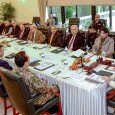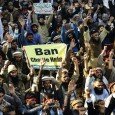By Irfan Bukhari –
Does Khan Want Justice or Attention?
Elections have never been considered fair and transparent by the contesting parties in Pakistan’s history. The allegations of rigging and stolen mandates has been our tradition. The country is again in the grip of political instability due to a storm created by self-styled messiah Imran Khan and his followers, who are poised to stage a ‘mammoth’ sit-in at the capital city on August 14 (Independence Day) against alleged rigging in the 2013 general elections.
No one knows despite ongoing debates in the media what’s actually going to happen with Khan’s long march and whether the exercise will derail or strengthen democracy in the country. PTI’s initial demand of thumb verification of four selected constituencies has turned into a call for an entire audit of the 2013 elections while the existing constitutional and legal statutes give no authority to the incumbent PML-N government to order such audits and verifications. “How can the government ask any authority for a election audit? It is the job of the election tribunals and Election Commission of Pakistan,” said Siddiq-ul-Farooq, PML-N central leader.
A number of political parties that questioned the transparency of 2013 elections including the PPP and Jamaat-e-Islami are also reluctant to join hands with Khan in fearing that it may cause derailment of democratic order in the country. PPP leaders claim that Asif Ali Zardari’s recent statement favouring PTI’s demand of thumb verification in four constituencies was merely meant to put pressure on the federal government in the wake of ongoing tensions between the centre and Sindh.
Jamaat-e-Islami, the PTI’s ally in Khyber Pakhtunkhwa government, is also keeping itself away from the August 14 adventure. “We have serious reservations over 2013 general polls, we even boycotted elections in Karachi but the JI will not become a part of PTI’s long march,” said JI secretary general Liaqat Baloch.
A few decades ago, the general elections held on March 7, 1977 resulted in violence, civil disobedience and massive protests by the Awami National Party and its ally Pakistan National Alliance. Whilst negotiations between Bhutto and the opposition were still going on, the elections invited intervention of the Pakistan Army which led to the ouster and dismissal of ruling Prime Minister Zulfikar Ali Bhutto.
As PTI chief Imran Khan shows his intent to go to the extent of resigning from parliament if his demands are not met, perhaps a sober reminder of Pakistan’s history might be in order.
Meanwhile the Election Commission of Pakistan says that such a decision can only be taken by the Election Tribunals.
“PTI’s demand of recounting and thumb verification of votes in four NA constituencies falls in the jurisdiction of Election Tribunals,” said secretary ECP Ishtiaq Ahmed. He said that under the law, the ECP can order recounting and even re-election in any constituency where it is convinced of prima facie irregularity but it could be done only within 60 days of the elections. “After the lapse of this period all such matters have to be dealt by the Election Tribunals,” he added.
It is pertinent to mentioned here that Section 46 of the Representation of Peoples Act (ROPA) 1976 envisages that a tribunal may order inspection of any counted ballot papers or opening of packets of counterfoils and certificates.
But, according to ROPA, the ECP may exercise this power before the expiration of 60 days after publication of the name of the concerned returned candidate in the official gazette. Where it does not finally dispose of such a case within this period, the election of such contestant will be deemed to have become final.
The media and political parties are criticizing election tribunals for not disposing of elections petitions timely thus creating a political crisis in the country. The Election Commission of Pakistan (ECP) notified the appointment of 14 fresh election tribunals (ETs) in consultation with the chief justices of the respective high courts in June 2013 which were constitutionally bound to make a decision within four months.
The Supreme Court too in November last year asked election tribunals to decide the election petitions within the proscribed timeframe of four months. The directions came in light of the PTI Secretary General Jehangir Tareen’s plea who had filed a petition challenging the election of Siddique Baloch from NA-154 through an election petition.
As per the Section 67(1A) of the Representation of the People Act (1976), the election tribunal must decide the case within four months of receiving the case from the election commission. The apex court, in its decision, held that the provisions of Section 67(1A) are mandatory in nature and failing to follow these entail penal consequences. As the tribunals failed in deciding cases in stipulated time, the Election Commission of Pakistan (ECP) in July this year extended the tenure of election tribunals for another three to six months.
According to a recent report of Free and Fair Election Network (FAFEN), 92 petitions still await decisions. The election results were officially notified on May 22, 2013, following which the candidates were given time until July 6 (45 days) to submit their petitions. The ECP received a total of 409 petitions, while one petition was filed directly with the Lahore tribunal. As many as 292 out of 384 petitions have so far been decided or disposed of by the tribunals.
Former secretary Election Commission of Pakistan holds higher courts responsible for the remaining cases. “The higher courts gave stay orders and that too for indefinite periods of time thus interfered in tribunals working otherwise these tribunals have done a better job than all those constituted in the past. The higher courts can hear appeals once tribunals give a verdict but these courts should not have issued stay orders against the tribunals’ working,” Dilshad added.
The PML-N and its allies are asking Khan to take up rigging matters in the parliament and courts of law and not on streets particularly in times when Pakistan’s armed forces are waging a war against terrorism. A parliamentary committee having representation of both houses (Senate & National Assembly) has also been constituted to propose amendments in existing electoral laws to avert rigging in future polls. The government has also announced celebrating Independence Day at Parade Avenue – the venue where PTI plans to stage sit-in – with army parade while Khan is still undeterred and not ready to put off his long march plans.
Parliamentary sources told Pique that the panel comprising 22 MNAs and 11 senators will prepare its recommendations which will be presented before the National Assembly within three months for legislation. The PTI remains skeptical of the parliamentary panel’s capacity to accomplish the task of electoral reforms and bring transparency and credibility to the election process ending the almost routine claims of rigging by the losing party.
The PTI has nominated three members including Arif Alvi, Shafqat Mehmood and Shireen Mazari for the committee but has not withdrawn its planned ‘million march’ on Islamabad on August 14.
PTI MNA Dr Arif Alvi, who is also a member of the reforms committee, stated that the sole purpose of the party was to stop rigging in future elections. “We are all set and we have also finalized our recommendations in this regard but we are not aware of the government’s intentions,” he added.
Alvi maintained that the long march has nothing to do with the parliamentary panel. “The long march is against the delaying tactics by the government to verify the thumb impression. The panel has been tasked to work on legislation, so the long march has nothing to do with it,” he stated.
Kunwar Muhammad Dilshad, former secretary Election Commission of Pakistan believes that no reforms can ensure transparency in future elections. “Existing laws are enough, the only thing needed is the will power of the Chief Election Commissioner and provincial election commissioners, when they start safeguarding the interests of the state and not various political leaders the elections will go fare and transparent,” he adds.
Political opponents of PTI allege that Khan is creating chaos on the behest of forces which are angry with the PML-N government over Pervez Musharraf’s trial. PPP leader Shehla Raza’s shocking revelations regarding Asif Ali Zardari’s visit to the United States further complicated the political landscape when she claimed that Zardari was calling on U.S. authorities to remind them about the unwritten clause of the 2007 NRO regarding non-imposition of martial law in Pakistan under guarantee of U.S., U.K., and U.A.E. This statement clearly reveals that the PPP is smelling a rat in Khan’s long march and Tahir-ul-Qadri’s revolution march.
Khan levels serious allegations on PML-N, Geo TV as well as former Chief Justice Iftikhar Muhammad Chaudhry but has yet to produce any substantial evidence before the public in justifying his claims. He claims that the polls were rigged by Returning Officers (ROs) who were all judicial officers but forgets that it was his demand that the elections be conducted under supervision of the judiciary.
After Arsalan Iftikhar’s announcement of filing disqualification reference against Imran Khan under Article 62, 63 of the Constitution, his father ex-Chief Justice Iftikhar Muhammad Chaudhry also sent a Rs.15 billion defamation notice to Imran Khan.
The notice, served through Iftikhar Chaudhry’s lawyer, stated that Khan defamed the ex-CJP after his retirement and allegedly involved him in political affairs. The legal notice asked Khan to take back his statements and tender an apology within 14 days, pay cash compensation to the tune of Rs20 billion or face criminal as well as civil charges for causing ‘mental torment’ to Iftikhar Chaudhry and his family.
“Khan’s protest will land the country in confusion and chaos,” says Rasul Bakhsh Rais, Director General Institute of Strategic Studies Islamabad. “As far PTI’s allegations of rigging are concerned,” he said, ”they are true, but the massive rigging was done in Karachi and Interior Sindh.” He said it was the legal duty of tribunals to dispose of petitions at the earliest. Mr Rais said that the PTI and all political parties should go for electoral reforms instead of long marches, something for which a parliamentary committee has also been constituted.
What's your reaction?
Happy
0%
Sad
0%
Thumbs Up
0%
Angry
0%
Unsure
0%
Surprised
0%






























































































